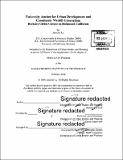| dc.contributor.advisor | Amy Glasmeier. | en_US |
| dc.contributor.author | Ly, Jennifer, M.C.P. Massachusetts Institute of Technology | en_US |
| dc.contributor.other | Massachusetts Institute of Technology. Department of Urban Studies and Planning. | en_US |
| dc.coverage.spatial | n-us-ca | en_US |
| dc.date.accessioned | 2016-06-22T17:53:52Z | |
| dc.date.available | 2016-06-22T17:53:52Z | |
| dc.date.copyright | 2016 | en_US |
| dc.date.issued | 2016 | en_US |
| dc.identifier.uri | http://hdl.handle.net/1721.1/103264 | |
| dc.description | Thesis: M.C.P., Massachusetts Institute of Technology, Department of Urban Studies and Planning, 2016. | en_US |
| dc.description | Cataloged from PDF version of thesis. | en_US |
| dc.description | Includes bibliographical references. | en_US |
| dc.description.abstract | In 2012, the City of Richmond submitted a proposal and was selected to be home of the Lawrence Berkeley National Laboratory (LBNL) Second Campus. The elimination of more than $1.5 billion in federal funding halted the project, after which the Berkeley Global Campus concept was developed and introduced by the University of California, Berkeley (UC Berkeley) chancellor. The proposed Berkeley Global Campus is an international research and education hub that Richmond anticipates will anchor a revitalized waterfront district. The campus is an opportunity to build from the ground up a university campus that will also generate wealth for the local community. Richmond is grappling with challenges that are familiar to many cities: 1) how to enable redevelopment of a vacant, previously industrial site, and 2) how to shape a university-community partnership that facilitates deep economic impact in communities in areas including employment, local procurement, and housing. As UC Berkeley and the City of Richmond remain committed to realizing the vision for the university campus, this period can be utilized to articulate a deliberative and inclusive planning process building on the planning and collaborative infrastructure already in place. This thesis explores how the City of Richmond can help facilitate the university campus development and achieve social goals based on wealth creation. | en_US |
| dc.description.statementofresponsibility | by Jennifer Ly. | en_US |
| dc.format.extent | 40 pages | en_US |
| dc.language.iso | eng | en_US |
| dc.publisher | Massachusetts Institute of Technology | en_US |
| dc.rights | M.I.T. theses are protected by copyright. They may be viewed from this source for any purpose, but reproduction or distribution in any format is prohibited without written permission. See provided URL for inquiries about permission. | en_US |
| dc.rights.uri | http://dspace.mit.edu/handle/1721.1/7582 | en_US |
| dc.subject | Urban Studies and Planning. | en_US |
| dc.title | University anchor for urban development and community wealth generation : Berkeley global campus in Richmond, California | en_US |
| dc.title.alternative | Berkeley global campus in Richmond, California | en_US |
| dc.type | Thesis | en_US |
| dc.description.degree | M.C.P. | en_US |
| dc.contributor.department | Massachusetts Institute of Technology. Department of Urban Studies and Planning | |
| dc.identifier.oclc | 951681105 | en_US |
